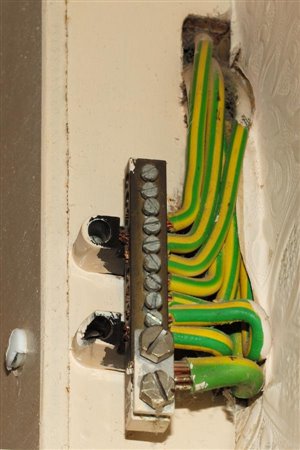Simon Barker:
Bonding every random bit of metal in the house to every other bit of metal, and to the supply earth, can cause electrocutions, rather than preventing them.
Imagine a case where you've just picked up an electric kettle, but the kettle is faulty and the case is live. You then touch the stainless steel kitchen sink.
If the kitchen sink is bonded, there is a clear path through you from the kettle to the sink and on to earth. You will be electrocuted. The current will not be enough to trip an MCB or blow a fuse.
Now imagine a modern kitchen where the sink is not bonded. There may be some leakage current through the sink, but a lot less than before. You are more likely to survive.
In both cases, an RCD would probably trip and save you, but only if the circuit has one. 15th edition circuits usually didn't.
So the modern thinking is that if it's not an extraneous conductive part, don't bond it. And stick RCDs on everything. ADS still applies to class I appliances, which are always earthed through their supply cable.
You mean like this?
Whilst I take the point, aren't most steel kitchen sinks bonded by virtue of the pipes to the metal taps? (Not forgetting the supplementary bonding between hot and cold!)
Any road, you'll be OK if you plug in the kettle to the SRCD by the back door. ?
Simon Barker:
Bonding every random bit of metal in the house to every other bit of metal, and to the supply earth, can cause electrocutions, rather than preventing them.
Imagine a case where you've just picked up an electric kettle, but the kettle is faulty and the case is live. You then touch the stainless steel kitchen sink.
If the kitchen sink is bonded, there is a clear path through you from the kettle to the sink and on to earth. You will be electrocuted. The current will not be enough to trip an MCB or blow a fuse.
Now imagine a modern kitchen where the sink is not bonded. There may be some leakage current through the sink, but a lot less than before. You are more likely to survive.
In both cases, an RCD would probably trip and save you, but only if the circuit has one. 15th edition circuits usually didn't.
So the modern thinking is that if it's not an extraneous conductive part, don't bond it. And stick RCDs on everything. ADS still applies to class I appliances, which are always earthed through their supply cable.
You mean like this?
Whilst I take the point, aren't most steel kitchen sinks bonded by virtue of the pipes to the metal taps? (Not forgetting the supplementary bonding between hot and cold!)
Any road, you'll be OK if you plug in the kettle to the SRCD by the back door. ?
We're about to take you to the IET registration website. Don't worry though, you'll be sent straight back to the community after completing the registration.
Continue to the IET registration site